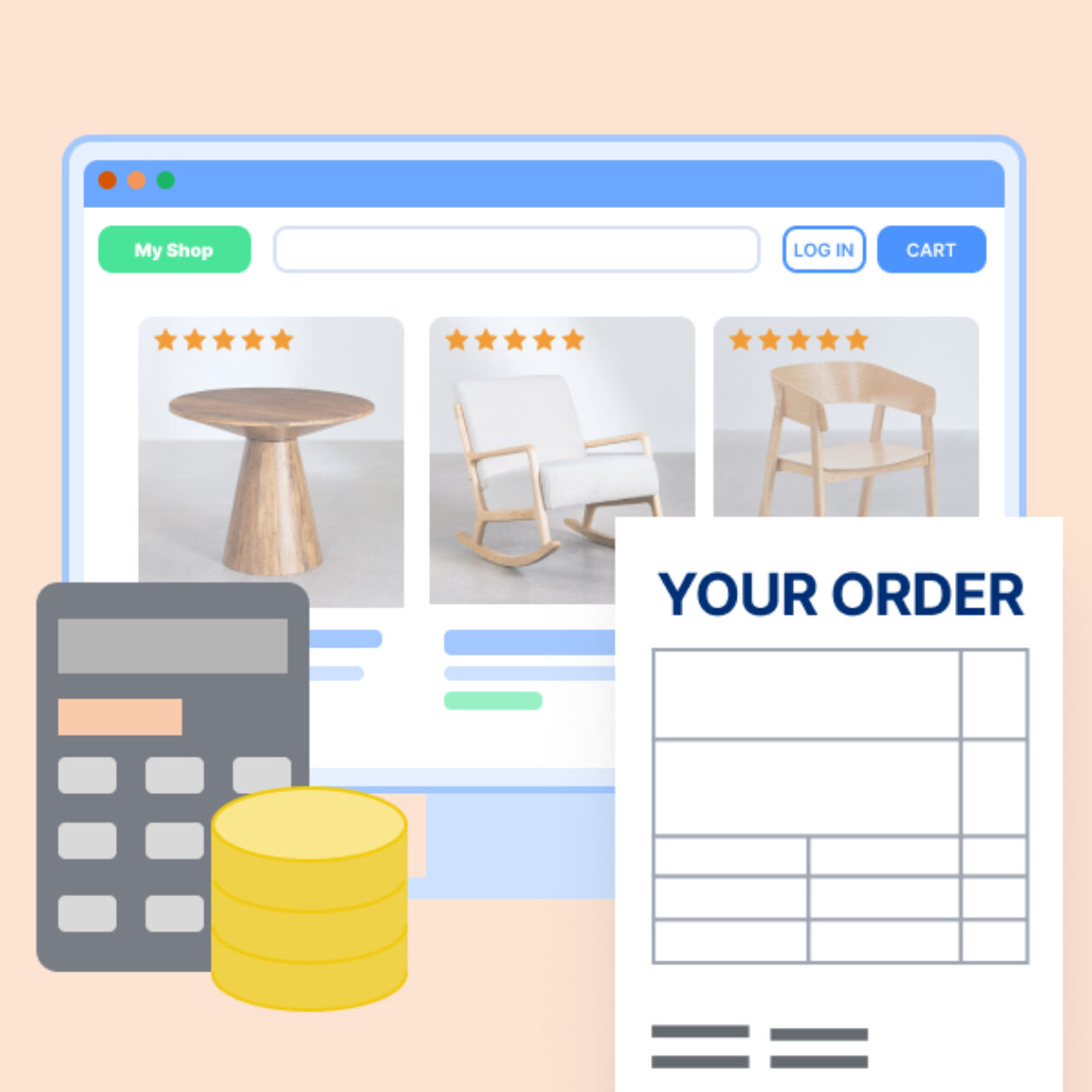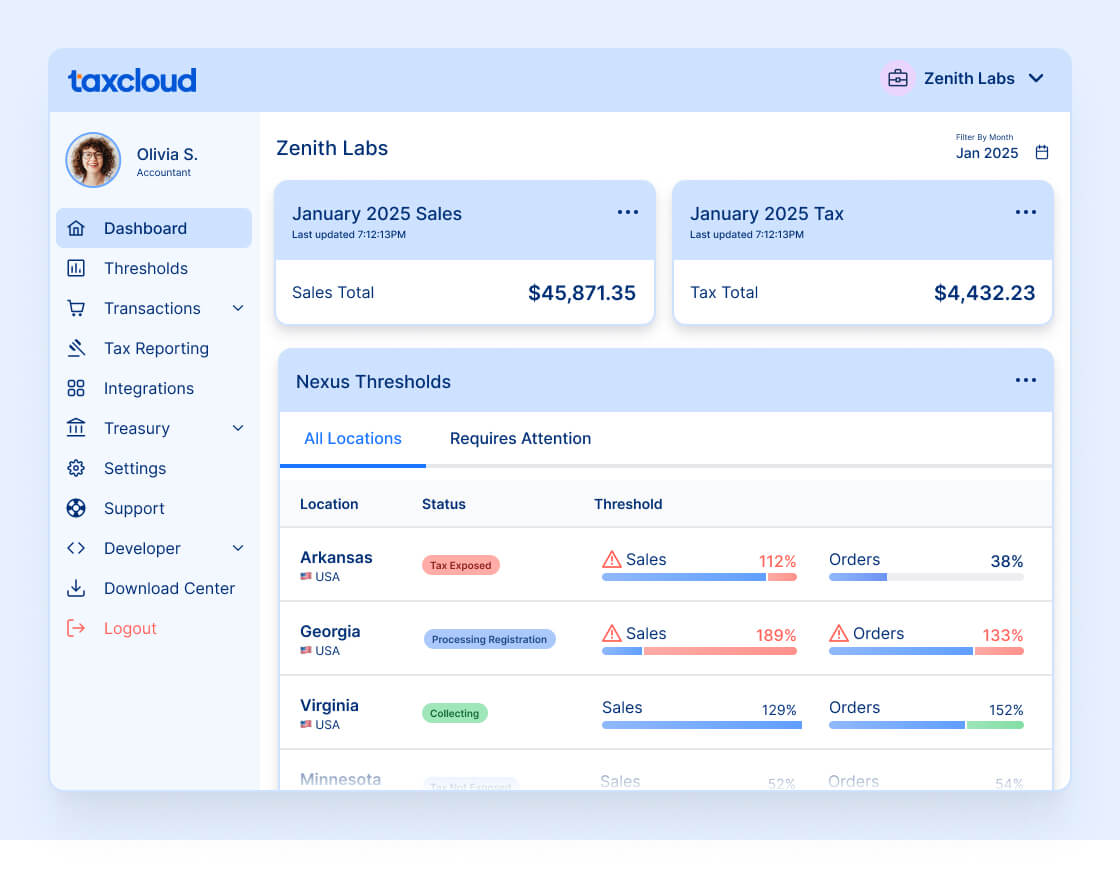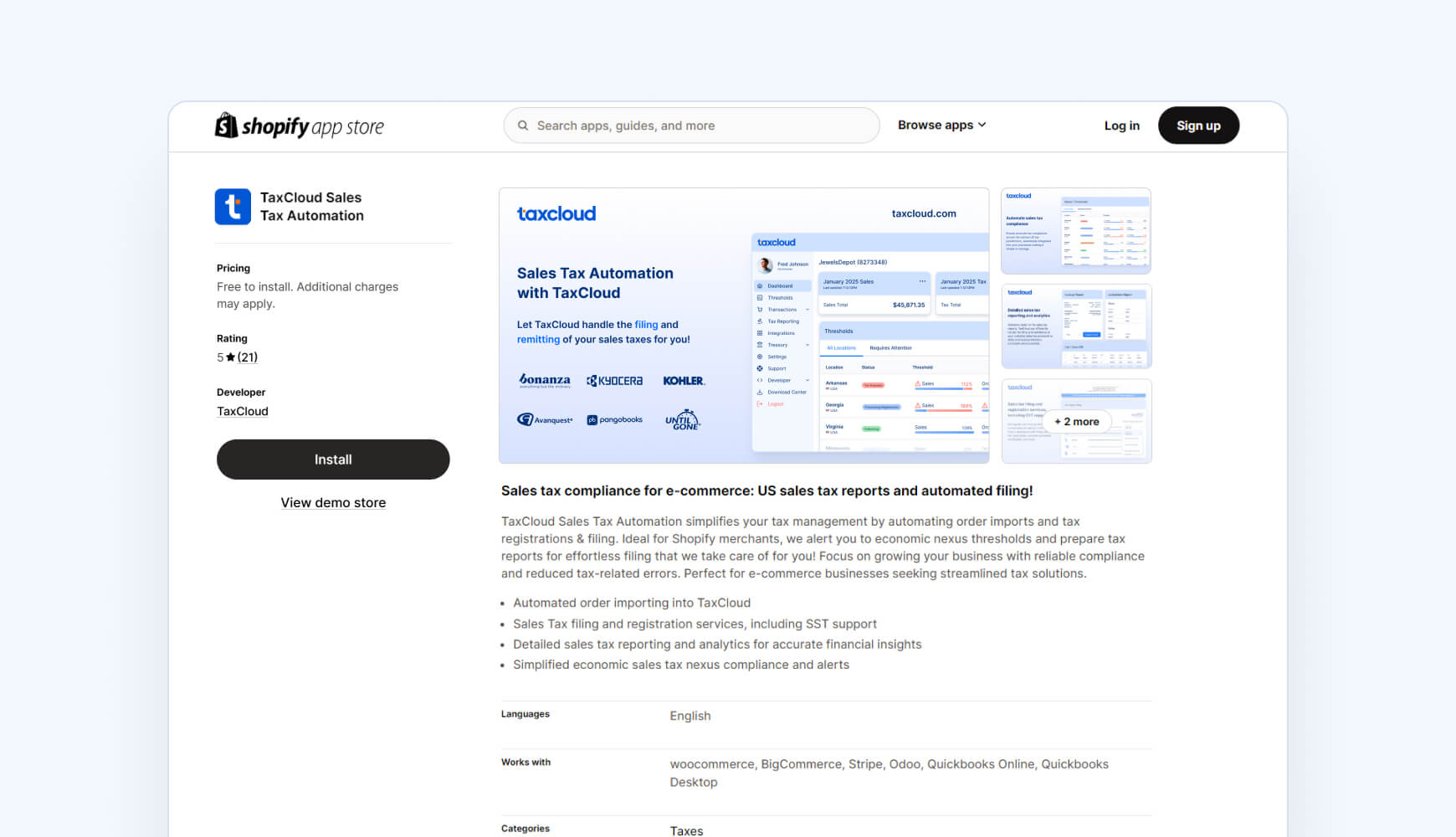
Ecommerce & Taxes: Sales Tax in the USA
While the best thing about selling online is that it allows businesses to expand their customer base, all those far flung sales can also lead to significant tax complexity. Online businesses don’t have to charge sales tax in states they’re not physically operating in until they’re considered to have achieved what’s known as ‘economic nexus’ in those states.
How does an ecommerce company achieve economic nexus? They have to meet certain ecommerce sales tax thresholds such as the number of sales or amount of total sales which vary from state to state.
But ecommerce and taxes can get complicated once a business has met those thresholds, it then has to calculate its ecommerce sales tax. But calculating sales tax for ecommerce companies can be complicated.
We’ll walk you through everything about ecommerce and taxes including how to determine when you need to charge and calculate ecommerce sales tax and how to calculate it. We even have an ecommerce sales tax calculator to help you understand how online store sales taxes work!
Do I need to collect sales tax for selling online?
Whether or not you need to collect ecommerce taxes depends on whether your business has reached nexus – or has a certain kind of connection – in the states your customers are buying from.
If your business has a physical presence such as a store, office, or warehouse in a state, you’re typically required to collect ecommerce sales tax for transactions within that state if that state has an online sales tax. With the popularity of online stores, the definition of sales tax nexus evolved beyond physical presence. Your store might not physically be in a state but you might have what’s known as ‘economic nexus’ there, depending on your sales revenue or transaction volume.
What qualifies you for economic nexus in each state varies.
That means that you have to keep track of your sales and transaction volume in every state to ensure you’re sales tax compliance. You can look up the requirements for each state here.
How to calculate sales tax
Whether you’re selling mugs with photos of your customers’ pets on them or replacement parts for microwaves, the steps to calculate ecommerce sales tax are the same.
Here’s how to calculate ecommerce sales tax accurately and ensure sales tax compliance for your business:
Determine Nexus
As discussed above, understanding where your business has economic nexus that requires you to collect sales tax is the first step you need to complete before you calculate ecommerce sales tax. Once you know everywhere you need to collect sales tax, you can ensure that you’re properly charging sales tax to your customers.
Register for Sales Tax Permits
Once you determine where your business has nexus, you’ll need to register for sales tax permits with the respective states’ tax authorities. This typically involves submitting an application and obtaining a permit or license to collect ecommerce sales tax within that state.
Categorize Your Inventory
Categorizing your inventory is necessary to properly calculate ecommerce sales tax. Some states make certain items tax-exempt or charge a lower sales tax rate on others. For example, diapers are tax-exempt in New York State whereas agricultural seeds are tax-exempt in Alabama. In Virginia, you’ll only need to charge 1% on things like personal hygiene products and groceries but you’ll have to charge the full sales tax rate of 5.3% on everything else.
If you only sell one type of item, categorizing your inventory for ecommerce taxes will be easy. However, if you sell items across many product categories this step could become complicated – especially if you need to charge sales tax in many jurisdictions with different sales tax exemptions.
Lookup the Right Sales Tax Rate
The U.S. has 13,000 tax jurisdictions and the amount in sales tax that each jurisdiction charges can be slightly different from the jurisdiction right next to it. If you’re calculating ecommerce sales taxes manually, you’ll have to look up every tax rate based on the location of the buyer to make sure you’re calculating the right rate. However, many ecommerce sales tax software options can automatically determine the right sales tax rate and charge your customers the accurate amount every time.
How to Calculate Sales Tax
Since each state has its own sales tax rates, the formula to calculate ecommerce sales tax will vary based on the state rate and whether city and county jurisdictions charge additional sales taxes. Integrate an ecommerce sales tax calculator tool or an ecommerce sales tax software into your store to accurately calculate the right tax rate for each transaction based on the customer’s location during checkout.
Many ecommerce platforms offer integrations with ecommerce sales tax calculation services to streamline this process.
Collect Tax Exemption Certificates
For those exempt from sales tax such as resellers or tax exempt organizations, consider offering them a way to purchase from you tax-exempt by collecting and maintaining valid exemption certificates to support tax exempt transactions. There are some ecommerce sales tax software options that help you manage exemption certificates.
Remit Collected Ecommerce Taxes
You’ll then have to remit your collected taxes and file your sales tax return with every state you collect ecommerce taxes in on a monthly, quarterly, or annual schedule depending on the state and your company’s filing obligations. Be sure to pay attention to deadlines and reporting schedule s for each state.
Keep Detailed Ecommerce Sales Tax Records
Be sure to maintain accurate records of sales transactions, tax collected, exemptions, and any other relevant documentation. Record-keeping is crucial for audits or in case of any discrepancies when it comes to ecommerce and taxes.
Given the complexities and variations in sales tax laws across different states, using an automated ecommerce sales tax software like TaxCloud can streamline the process and ensure sales tax compliance with all relevant regulations.
TaxCloud’s Ecommerce Sales Tax Calculator
When it comes to ecommerce and taxes, understanding the ins and outs of sales tax can be overwhelming. To help you get started on what we’ve outlined so far, we encourage you to check out our interactive ecommerce sales tax calculator and lookup tool. While you can’t use it to charge tax in your online store, it’s great for those new to calculating online sales tax or for those who just want to learn more about how complex sales tax is.
Use it to look up your sales tax obligations in states where you have economic nexus or are about to reach it. Or use it to learn more about the sales tax thresholds of different states via our interactive map and lookup tool. We also share online store sales tax guides for every state! It has the answers to anything and everything you want to know about ecommerce sales tax.
What happens when a business doesn’t pay sales tax?
When your business fails to pay the required ecommerce sales tax or pays the wrong amount when calculate ecommerce sales tax inaccurately, it can lead to a number of consequences that you very much don’t want. These consequences often depend on the severity of your non-compliance.
Here are some potential repercussions:
Sales Tax Penalties and Interest
Initially, your business may face penalties and interest fees for late or unpaid online store sales taxes. These penalties can accumulate over time and can be subject to interest, significantly increasing the amount owed.
Sales Tax Fines and Liens
Tax authorities can impose fines or issue liens against your business’ assets. Liens can affect the business’s ability to obtain credit or loans or affect your ability to land large customers who might do a credit check before signing a contract with you. It could even lead to the seizure of your business’ assets to satisfy the tax debt. That’s why it’s so important to know as much as about ecommerce and taxes: A mistake could be the end of your business!
Legal Action and Audits
If you continue not to pay or evade your online store sales tax obligations that could lead to legal action. Tax authorities could initiate audits to investigate financial records and practices. Audits aren’t just time-consuming, they can also be costly and lead to additional penalties if discrepancies or deliberate non-compliance are found.
Revocation of Your Business License
In extreme cases, continued non-payment or flagrant disregard for tax obligations can lead to your business license being revoked over unpaid online store sales taxes.
Personal Liability
If you run a small business or sole proprietorship that’s not incorporated, the business owner might be held personally liable for unpaid online store sales taxes. This can put your personal assets at risk.
Criminal Charges
Deliberate or severe cases of tax evasion can lead to criminal charges against the business or its owners, potentially resulting in fines, imprisonment, or both.
While that paints a pretty alarming picture, the good news is that not everyone who pays their ecommerce sales tax late or calculates their ecommerce sales tax incorrectly ends up in prison or has their business license revoked.
Still, no business wants to face sales tax compliance issues since they can quickly add up with fines, interest, and penalties. Businesses must prioritize tax compliance, keep accurate financial records, and address any tax issues promptly to avoid facing these repercussions.
Calculate Ecommerce Sales Tax with TaxCloud
Helping online sellers easily calculate ecommerce sales tax is what we do at TaxCloud. TaxCloud’s ecommerce sales tax software is essential to ensure sales tax compliance and reduce the risk of errors when you calculate ecommerce sales taxsales tax.
Not only does TaxCloud integrate with your existing ecommerce platform (like Shopify, BigCommerce, WooCommerce, and more!) to calculate ecommerce sales taxes for you but it keeps tabs on which states you’ve achieved economic nexus in – and which you’re about to. We also have a U.S.-based support who can answer any questions you have.

Here’s how TaxCloud helps:
- Accurately Calculate Ecommerce Sales Tax: TaxCloud’s real-time sales tax calculator calculates ecommerce sales taxes across over 13,000+ US jurisdictions to ensure your online store sales tax calculations are accurate, significantly minimizing the potential for errors in charging the correct tax amounts.
- Online Store Sales Tax Threshold Alerts: With TaxCloud, there’s no need to learn the complex economic nexus rules for each state yourself. TaxCloud’s software monitors thresholds and notifies you when you reach a point where registration and tax collection in a new jurisdiction are necessary.
- Notifications on Deadlines for Ecommerce Taxes: Stay updated on your tax obligations, eliminating the risk of missing crucial filing deadlines. TaxCloud gives you notifications of when and where you need to file taxes – or we can even handle tax filing and remitting for you.
- Effortless Tax Reporting: TaxCloud’s software generates comprehensive, ready-to-use sales tax liability reports for each jurisdiction. And it also recalibrates your sales taxes when returns are processed.
- Audit Support and Documentation: In the event of an audit, TaxCloud will help you! With the documentation you need and support from our team, you’ll have everything required to navigate the process effectively.
